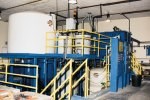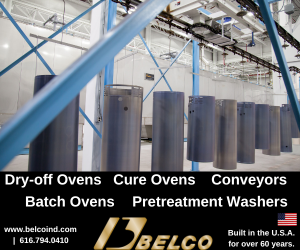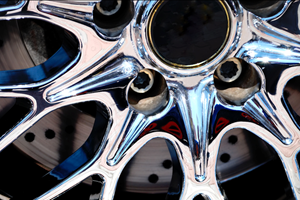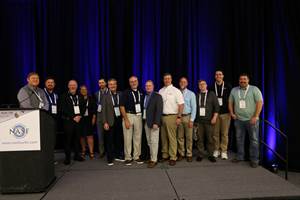The Little Plating Shop that Could
Electro-Spec, Inc. celebrates 40 years in the plating business...
In 1959:
- Hawaii became the 50th state;
- Castro became the premier of Cuba;
- DeGaulle became president of the Fifth Republic in France;
- The U.S.S.R. launched a rocket with two monkeys aboard;
- Iowa defeated California 38-12 to win the Rose Bowl; and
- Electro-Spec Plating was founded.
Clarence Yates opened Electro-Spec Plating (then called Economy Plating) in a garage and chicken coop measuring 2,200 sq ft. In this shop, just north of Indianapolis, Mr. Yates refurbished antiques and experimented with other finishing processes. The company remained at this location until 1989, when it moved to Franklin, Indiana.
In the 1960's the company partnered with Specialty Connectors, an electronic connector manufacturer. As this company grew, so did Economy Plating. Co-owners Dave Yates (Clarence Yate's son) and Jim Funk saw great growth potential in the connector industry and decided to concentrate on serving it. Soon the company was the major plating supplier for Specialty Connectors. In 1989, Specialty Connectors moved its operations to Franklin, Indiana, prompting Economy to consider a similar move.
Even though Electro-Spec was grandfathered in on regulatory matters at its northern Indianapolis plant, it chose to move to Franklin to better service its customers. At this time, the company also changed its name to better reflect the company's business and capabilities. The name Electro-Spec, Inc. was chosen.
"The city of Franklin worked with us in setting up our waste treatment system," stated Mr. Funk. "Also, we came to closure really well at the old plant. We did not need to have any remedial action taken." Electro-Spec's move was trouble-free because Clarence Yates had started treating his plating wastes in the 1960's.
"Even today," noted Jeffrey Smith, president, "we spend a lot of money on waste treatment. It is our insurance. You can be a great plater, but if you do not monitor and comply with regulatory issues, you can forget it."
The old building could easily fit in the new 13,000-sq-ft facility. The company has experienced much growth in the past 10 years and plans to expand its facilities and add additional plating lines in the next couple of years.
Electro-Spec offers gold, silver, nickel, copper, tin and TRI-M3 plating. Most of the work is plated using barrels; however, racks are also used. All plating is done manually because of the variety of jobs. Many of the parts are small; you can hold 5,000 to 10,000 of some parts in the palm of your hand. These parts and others are for the aerospace, military, electronics and electromechanical industries. Electro-Spec also plates on some exotic metals, including molybdenum, beryllium and titanium. "We actually plate on just about everything but aluminum," noted Mr. Smith.
Gold electroplating in both barrel and rack conforms to MIL-G-45204C, Types I and II. The deposit is 99.8% pure with a Knoop hardness of 130-200. The contact resistance is 0.6 milliohms.
TRI-M3 is Electro-Spec's trade name for a trialloy finish of 55-60% copper, 25-28% tin and 14-18% zinc. This type of plating has been around since W.W.II, but has not made many inroads in the U.S. "We looked into it several years ago," stated Mr. Smith.
The finish has excellent properties that could benefit a number of industries. "We feel this finish represents a dramatic improvement in plating connectors and components that require high corrosion resistance and high resistance to tarnishing," explained Mr. Smith.
With characteristics and shelf life that surpass traditional silver, TRI-M3 plated connectors also provide better electrical performance than nickel. Silver also has excellent electrical properties but tarnishes and breaks down over time. Nickel provides a longer shelf life and wear characteristics, but is not practical in several RF applications. It tends to exhibit poor intermodulation performance, high permeability and poor screening effectiveness.
Connectors and components plated with TRI-M3 display the following characteristics:
- Excellent corrosion resistance even in harsh environments
- Low surface friction that is approximately 70% of silver
- High conductivity
- Excellent abrasion resistance that is ideal for mating applications
- Solders easily with standard 60/40 tin-lead solder
- Low internal stress permitting forming
- Hardness 300-380, approximately 50 Rockwell C
- Density of 7.9-8.1 g/cm3
- Ability to plate over existing metals or can be used as an undercoating
- Excellent deposition qualities and uniformity
- Requires less thickness for protection and wear resistance
- Non-magnetic finish; and
- Can be barrel or rack plated.
RF and microwave electronic companies are also quite interested in the finish since it is much harder than silver. Because of this, it provides excellent wear on mating parts. Solderability is also important, and it is not magnetic, which is significant. Also, the finish does not have shelf-life issues as with silver, since it does not tarnish.
Electro-Spec also offers vacuum vapor degreasing. Its performance is said to exceed all federal and state regulations. The system uses perchloroethylene, yet it virtually eliminates emissions and minimizes waste. Degreasing is done in a totally enclosed vacuum atmosphere where compounds are used in their vapor state to completely remove soils. The cleaning fluid is recovered and reused so the total solvent used is minimal.
Although Electro-Spec offers several finishing and cleaning processes, the prevailing fundamentals are quality and quick turnaround. To bolster its quality program, Electro-Spec earned ISO certification. All parts are tracked using bar coding from incoming inspection, through plating inspection to final inspection prior to shipping parts out. Each station has a bar-code system to track the parts, so management knows where they are at any time.
Not only can management access the information, but Electro-Spec has given its customers access to the data via their own computers. Using this system, customers can also change how something is plated, enter special requests or expedite a job. The system is updated every 30 seconds so Electro-Spec and its customers can stay on top of all jobs at all times. Expedited jobs, special requests and/or process changes are flagged in red on the computer screen.
Another vital aspect to Electro-Spec's quality program is employee training. The company instituted training to help employees understand that plating is not just a process. Using the Kushner Electroplating School, employees learned why they do what they do. They learned why plating thickness is important, how to troubleshoot and the reasoning behind the processes. Not only did Electro-Spec teach those running the plating shop, office workers and inspectors also participated.
Quality is characteristic not only of Electro-Spec's plating but also of its business. Although it all started in a little chicken coop, it has maintained quality as it has grown into a first class company. "Even in our infancy, our commitment was to be the first and best. That sentiment has been the foundation for our 40 years of growth," Mr. Smith concluded.
To learn more visit Asterion and Kushner Electroplating School.
Related Content
How to Maximize Nickel Plating Performance
The advantages of boric acid-free nickel plating include allowing manufacturers who utilize nickel plating to keep up the ever-changing regulatory policies and support sustainability efforts.
Read MoreA Chromium Plating Overview
An overview of decorative and hard chromium electroplating processes.
Read MoreProducts Finishing Reveals 2023 Qualifying Top Shops
Each year PF conducts its Top Shops Benchmarking Survey, offering shops a tool to better understand their overall performance in the industry. The program also recognizes shops that meet a set of criteria to qualify as Top Shops.
Read More3 Tests to Ensure Parts are Clean Prior to Plating
Making sure that all of the pre-processing fluids are removed prior to plating is not as simple as it seems. Rich Held of Haviland Products outlines three tests that can help verify that your parts are clean.
Read MoreRead Next
Episode 45: An Interview with Chandler Mancuso, MacDermid Envio Solutions
Chandler Mancuso, technical director with MacDermid Envio discusses updating your wastewater treatment system and implementing materials recycling solutions to increase efficiencies, control costs and reduce environmental impact.
Read MoreDelivering Increased Benefits to Greenhouse Films
Baystar's Borstar technology is helping customers deliver better, more reliable production methods to greenhouse agriculture.
Read MoreA ‘Clean’ Agenda Offers Unique Presentations in Chicago
The 2024 Parts Cleaning Conference, co-located with the International Manufacturing Technology Show, includes presentations by several speakers who are new to the conference and topics that have not been covered in past editions of this event.
Read More















.jpg;maxWidth=300;quality=90)







